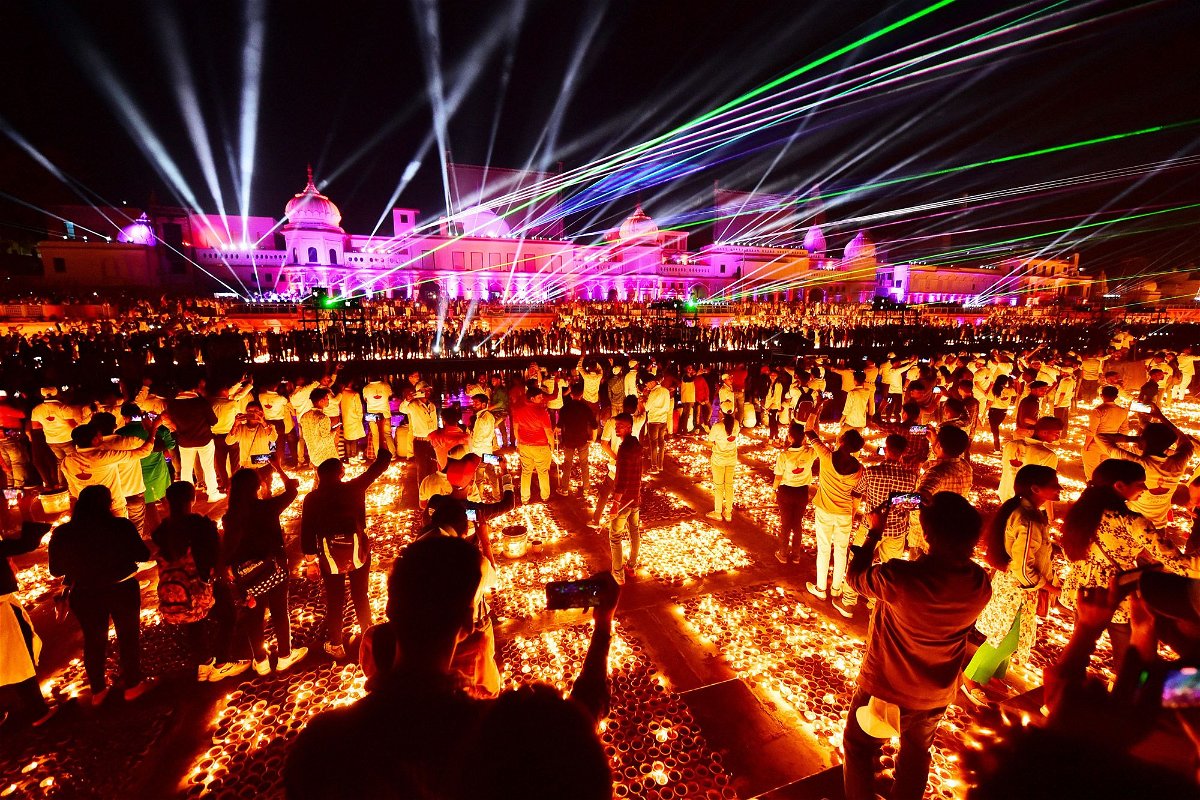What to know about Diwali, the Festival of Lights

By Harmeet Kaur, CNN
(CNN) — More than a billion Hindus, Sikhs, Jains and Buddhists around the world are celebrating Diwali, the festival of lights.
Diwali, also called Deepavali, is one of the biggest festivals in India. It’s also widely celebrated in Nepal, Malaysia, Fiji and other countries with large South Asian diasporas. Homes, businesses and public spaces are lit up with diyas, or oil lamps made from clay, and fireworks displays abound. People gather with their families, eat sweets and exchange gifts.
Despite its deep religious significance, Diwali today is also a cultural festival observed by people regardless of faith.
Here’s what to know about the holiday.
What is Diwali?
Diwali comes from the Sanskrit word deepavali, meaning “row of lights.”
It marks the triumph of light over darkness, of good over evil. Though Diwali traditions vary according to region and religion, the myths and historical stories behind the holiday share themes of justice and liberation.
When is Diwali?
Diwali is celebrated every year in autumn, usually falling between October and November. The festival lasts five days, with the main celebration occurring on the third day. This year, Diwali will be observed on November 12.
These are the five days of Diwali:
• Dhanteras: People typically mark the first day of Diwali by purchasing gold and silver jewelry, utensils and other new household items for good luck. Many clean their homes to invite the blessings of Lakshmi, the goddess of wealth and prosperity. Others also honor Dhanvantari, the god of Ayurveda, and Yamaraj, the god of death, on this day.
• Choti Diwali, or Naraka Chaturdashi: The second day of Diwali marks Lord Krishna’s defeat of the demon king Narakasura. People wake up early to bathe and wash their hair. They also clean their homes, decorate them with rangolis and diyas and prepare sweets.
• Diwali, or Lakshmi Puja: The third day of the festival is what people typically think of as Diwali. Families gather to exchange gifts, feast on scrumptious dishes and indulge in sweets. Many Hindus worship the goddess Lakshmi on this day.
• Padwa, or Govardhan Puja: The fourth day of Diwali honors the relationship between husband and wife, and husbands will typically buy a gift for their spouses. In some traditions, it commemorates the day Lord Krishna lifted Govardhan Hill to protect villagers of Vrindavan from rains brought on by Lord Indra’s anger. Some devotees offer a mountain of food to Krishna in remembrance, while others make clay and cow dung figures recreating the event.
• Bhai Dooj: The final day of Diwali celebrates the love between siblings, in honor of the bond between Lord Yama and his sister Yami (or Yamuna). Sisters will sometimes place a tilak, or red mark, on their brothers’ foreheads, while brothers will give gifts to their sisters.
What is the meaning of Diwali?
Diwali is largely observed by Hindus, Sikhs, Jains and Buddhists, but much like Christmas, the holiday transcends religion and is now celebrated by many people outside those traditions.
The meaning of the festival varies by community and region.
One of the legends at the heart of Diwali comes from the Hindu epic, the Ramayana. During the exile of Prince Rama (an incarnation of the god Vishnu) and his wife Sita (an incarnation of the goddess Lakshmi), Sita is kidnapped by the demon king Ravana. Rama ultimately defeats Ravana to rescue his wife. For some Hindus, Diwali marks Rama and Sita’s triumphant return to their kingdom after 14 years of exile.
Some Hindus in southern India celebrate Lord Krishna’s defeat of Narakasura, which led to the rescue of 16,000 girls in the demon’s captivity. In western India, Diwali commemorates the day that Lord Vishnu banishes the demon king Bali to rule the netherworld.
Sikhs commemorate the occasion as “Bandi Chhor Divas” (The Day of Liberation). It marks the day that Guru Hargobind, their sixth guru, and 52 Hindu kings were freed from wrongful imprisonment. The Mughal Emperor Jahangir initially only agreed to release Guru Hargobind, but the guru refused to go without the royals. After Jahangir declared that those who could hold onto the guru’s cloak could leave, Guru Hargobind tied 52 tassels to his cloak so that each ruler could walk to freedom.
For Jains, Diwali signifies the day Lord Mahavira, their last spiritual leader, attained physical death and achieved enlightenment. Some Buddhists acknowledge Diwali as the day the Emperor Ashoka embraced Buddhism.
How is Diwali celebrated?
Aside from the common traditions of decorating one’s home, setting off firecrackers and feasting on delicious food, there are several other ways that people mark Diwali.
In some parts of India, people play gambling card games such as teen patti, blackjack and poker. Gambling during the holiday is considered auspicious, stemming from a legend in which the god Shiva and his consort Parvati play a dice game.
Diwali also marks the start of the new Hindu financial year, and many businesses, traders and shopkeepers open new accounts books during the holiday.
The-CNN-Wire
™ & © 2023 Cable News Network, Inc., a Warner Bros. Discovery Company. All rights reserved.
Naomi Canton contributed to this piece.